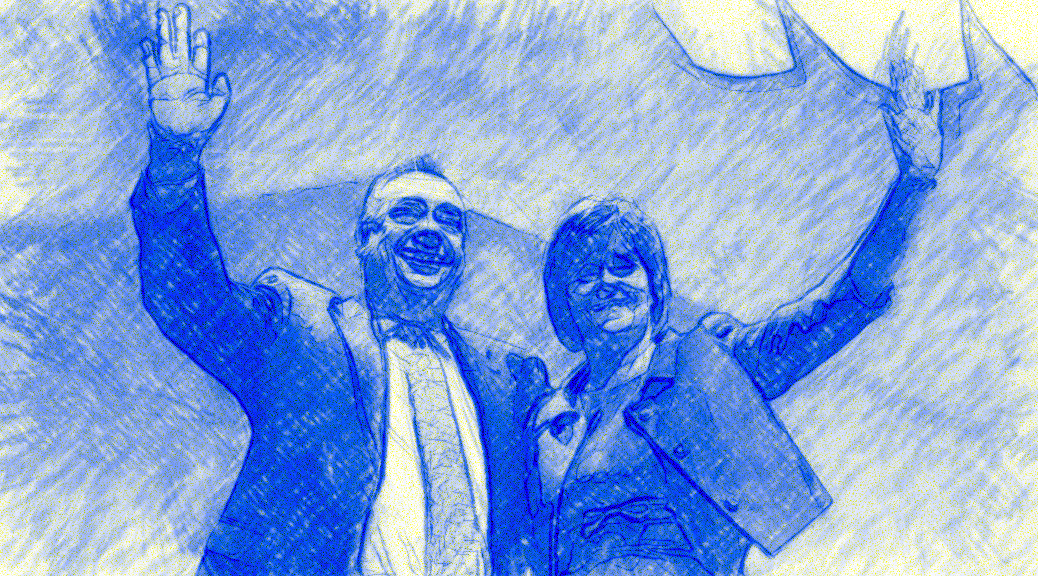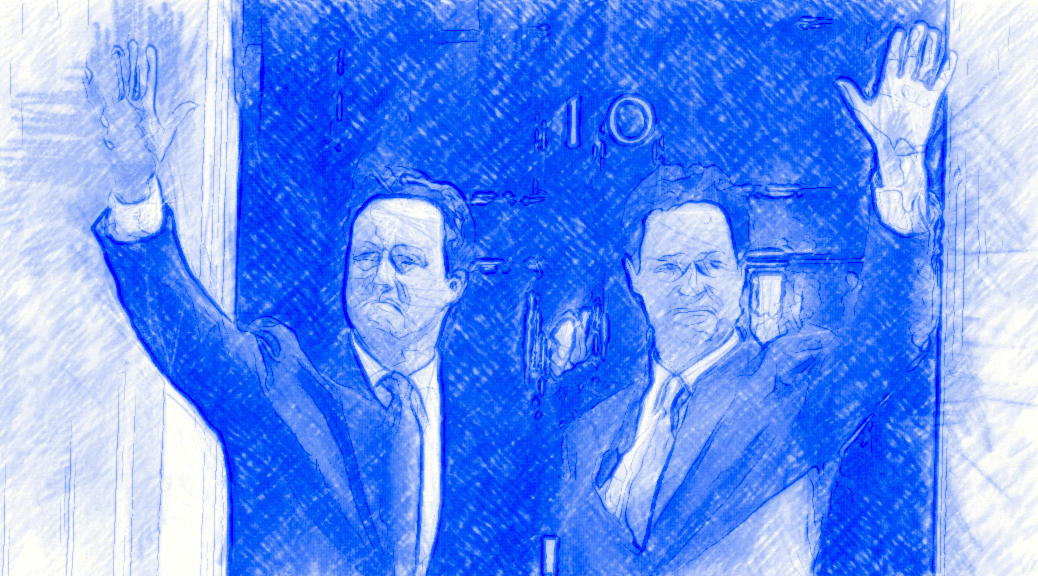Election A to Z — U is for UKIP

Contents
Media blackout
You would be forgiven for thinking that the UK Independence Party (UKIP) had decided against fighting the general election. The only media coverage of the party has been negative coverage. We have had expenses fiddling, open racism from junior members of the party, death threats from candidates and horror stories from disgruntled former members.
We have had the ridiculous drama-doc from Channel 4 covering the first 100 days of a UKIP government (!) and a less dramatic documentary from the BBC about the party’s members. Some of them are a little odd you see, unlike say the Greens. At the moment we have a comedy show every night on Channel 4 which is consistently insulting.
So UKIP must be doing something right. And that thing is Nigel Farage, the party’s charismatic leader. During 2014, whenever Nigel was on TV, whatever he said – more importantly, however shocking the London media found his comments – the UKIP vote went up.
So they have shut him down. When he does appear on TV, which is not often for the leader of a party polling double the vote of the Lib Dems and triple that of the SNP, he his heckled by carefully chosen hostile audiences and / or minority interviewers.
Living in the past
UKIP voters are old, and not very edcuated. They “don’t recognise the country I’m living in anymore.” They live in decaying seaside resorts and post-industrial welfare towns. They aren’t sexy. They don’t use social media.
And they aren’t the voters that anybody else wants. They represent the past, when all the mainstream parties are looking to the future. They are the people for whom things aren’t working out, but not the people who must be helped. They are unfashionable. What they want doesn’t matter, except to UKIP.
The Tories have the policies to fight back – the triple-locked pension, the ring-fenced NHS, the EU referendum. It’s the wooing they can’t manage – they can’t seem to hold their nose and sell themselves to yesterday’s English.
What does UKIP want?
Most people would struggle to name more than a couple of UKIP policies. They want a referendum on EU membership – nowadays a mainstream position, supported by a majority of the electorate and something to which Cameron has agreed – and they want to bring in an Australian style points system for immigration.
The other policies – free parking at hospitals, smoking in pubs, cutting foreign aid – seem peripheral. And beyond that it’s a bit of a guessing game. They are un-PC, so the guess is they would take the non-PC position on an issue.
Going beyond this, and contributing further to their popularity – particularly in the English regions (see below) – is that they are anti-Westminster and anti-London, in the same way as the SNP and the Welsh and and Irish nationalists. This does not bode well for Labour in the long-term.
But what does the party itself really want? Are they a protest party who will disband following an EU referendum, or do they have long-term goals? Given the media hostility towards them, they are naturally cagey about sharing, but the strategy appears to be something like this:
- get Nigel into Westminster, since he has a national profile and is widely popular ((Nigel has said he will quit if he doesn’t win his seat, which could be a close-run thing; that it turn could lead to a UKIP collapse))
- do well up north, where the Tories are largely unelectable, in case people run out of patience with Labour in a similar way to recent developments in Scotland
UKIP are already much stronger in what are seen as Labour strongholds than most people think. Their European Parliament vote was spread throughout the country, albeit mostly at the edges.
Further progress will probably depend on Labour forming the next government and continuing with austerity. The extra government spending promised by Milliband and Balls may seem attractive to some at present, but in practice it may prove undetectable. ((Labour’s pro-Muslim stance will also be a factor in areas subject to racial tensions in the wake of the abuse scandals involving white girls and Asian men))
It may seem odd to be planning for the 2020 election when Cameron has promised an EU-referendum in 2017, but a minority Labour government could change everything.
No deal with the Tories
As UKIP became more popular between 2010 and 2014, many commentators on the right – myself included – expected that some kind of informal or formal deal would be done between the Tories and UKIP.
Farage and Cameron clearly don’t get on, partly because of Cameron’s 2006 comment that “Ukip is sort of a bunch of … fruitcakes and loonies and closet racists mostly.”
But to not do a deal would risk letting Labour in, a much worse prospect than working alongside someone you don’t respect. There were also plenty of policies in common: sovereignty, enterprise, controlled immigration, small state, low taxes, school choice, freedom of speech etc.
But no deal was forthcoming. In 2014 Toby Young set up “Country Before Party” to persuade party activists to arrange local deals without head office permission. But serious pushback from both party operations convinced him to shelve the idea.
The nearest to cooperation we have been since then – and it was not very near – was the suggestion from Patrick O’Flynn – UKIP economics spokesman and spin doctor – that “if the Tories really want to stop a Labour government, then perhaps, unilaterally, they should stand aside in those seats.” ((The seats north of Birmingham where voting Tory may well aid the election of a Labour MP))
Posh and posherer
Young believes that Farage delights in frustrating Cameron, because Farage believes that the Tories have abandoned people like him. Both Farage and Cameron are the public-school sons of stockbrokers, but Eton, Oxford and the Bullingdon mean that Cameron is posher.
Only slightly posher to most of us, but perhaps infinitely so to the men themselves. Like intra-metropolitan football rivalries and the old joke about the protestant sects, the closer you are in a hierarchy, the greater the divisions seem. (( Emo Phillips, 1985: Once I saw this guy on a bridge about to jump. I said, “Don’t do it!” He said, “Nobody loves me.” I said, “God loves you. Do you believe in God?” He said, “Yes.” I said, “Are you a Christian or a Jew?” He said, “A Christian.” I said, “Me, too! Protestant or Catholic?” He said, “Protestant.” I said, “Me, too! What franchise?” He said, “Baptist.” I said, “Me, too! Northern Baptist or Southern Baptist?” He said, “Northern Baptist.” I said, “Me, too! Northern Conservative Baptist or Northern Liberal Baptist?” He said, “Northern Conservative Baptist.” I said, “Me, too! Northern Conservative Baptist Great Lakes Region, or Northern Conservative Baptist Eastern Region?” He said, “Northern Conservative Baptist Great Lakes Region.” I said, “Me, too!” Northern Conservative Baptist Great Lakes Region Council of 1879, or Northern Conservative Baptist Great Lakes Region Council of 1912?” He said, “Northern Conservative Baptist Great Lakes Region Council of 1912.” I said, “Die, heretic!” And I pushed him over.))
Cameron is the archetype of all those people that rejected all those people who feel rejected. He would be better off following Boris’s approach, though that might not be something that everyone can pull off.
Where did it all go right?
UKIP began life back in 1993 as a Eurosceptic pressure group. At the time, its founders – amongst them Farage – would have seen the party’s current levels of popularity as success. Yet the feeling remains that following their victory in the European parliament elections last year, they should be doing better.
That they are not is partly down to Labour’s refusal to roll over in the face of overwhelming economic evidence that the current government knows what it is doing, partly because Ed Milliband does not seem to repel voters to the extent that was expected, and partly because the emergence of the SNP since losing the Scottish referendum has taken the spotlight off UKIP, and reminded a certain section of the English electorate that it’s not just the EU they need to worry about.
It is important to remember that the reason this is the closest general election in loving memory is UKIP. The SNP are heading for a landslide in Scotland, but they have only four percent of the vote, and the vast majority of their new seats will be taken from Labour.
The right wing vote has increased substantially since 2010, and in normal circumstances Cameron would be heading for a majority. He is not because UKIP took 15% of the vote from him last year, and despite the southern English fear of a Labour/SNP government, he is unlikely to get much more than half of it back on polling day.
UKIP may be on course for only two or three MPs, but they have changed the course of this election. And who knows, they may still get their referendum. Something that Nigel would undoubtably raise a glass to.
To see more of our election coverage, please go to our Election A to Z page.
Until next time.

















